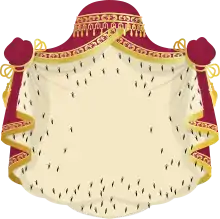
Mantle with a pavilion on top
In heraldry, a mantle is a symbol of sovereign power and is generally reserved for royalty. In some cases, its use has also been granted to other nobles, in recognition of particular merits. In ordinary rendering, the mantle is usually crimson and lined with ermine.
Certain coats of arms may also display a pavilion (similar to a baldachin) surmounting the mantle. The pavilion is said to be the invention of the Frenchman Philip Moreau.[1]
While common in continental European heraldry, the mantle and pavilion is absent in English and Scottish heraldry.[2]
Mantle and pavilion should not be mixed with Mantling.
Gallery
Mantles
Royal mantles
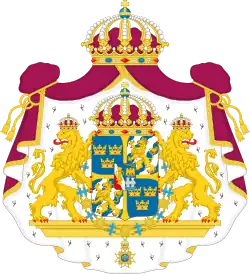 Greater arms of Sweden, featuring a purple mantle but with no pavilion
Greater arms of Sweden, featuring a purple mantle but with no pavilion King Carl XVI Gustaf of Sweden's former arms as crown prince, with a blue mantle reflecting the Swedish princely mantle
King Carl XVI Gustaf of Sweden's former arms as crown prince, with a blue mantle reflecting the Swedish princely mantle
Non-royal mantles
 Heraldic ornaments of a French duke and peer
Heraldic ornaments of a French duke and peer Mantle and princely hat of a Prince of the Holy Roman Empire
Mantle and princely hat of a Prince of the Holy Roman Empire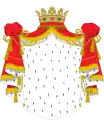 Mantle and coronet of an Italian duke
Mantle and coronet of an Italian duke Mantle and princely hat of a Polish prince
Mantle and princely hat of a Polish prince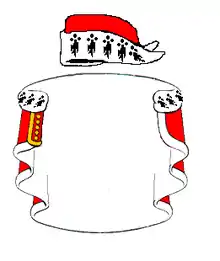 Historical mantle and chapeau of a Scottish feudal baron
Historical mantle and chapeau of a Scottish feudal baron Mantle and coronet of a Grandee of Spain
Mantle and coronet of a Grandee of Spain Mantle and princely hat of a Russian prince
Mantle and princely hat of a Russian prince
Mantles of chivalric orders
.svg.png.webp)
 Arms of Maximilian von Fürstenberg with the mantle of the Order of the Holy Sepulchre
Arms of Maximilian von Fürstenberg with the mantle of the Order of the Holy Sepulchre.svg.png.webp) Arms of the Sovereign Military Order of Malta
Arms of the Sovereign Military Order of Malta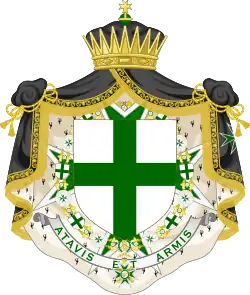 Arms of the Order of Saint Lazarus
Arms of the Order of Saint Lazarus
Mantles with pavilions
 Napoleonic heraldic mantle and pavilion, with a Napoleonic crown
Napoleonic heraldic mantle and pavilion, with a Napoleonic crown.jpg.webp) Coat of arms of the Dutch monarch, with a mantle and pavilion
Coat of arms of the Dutch monarch, with a mantle and pavilion Grand coat of arms of the Kingdom of France
Grand coat of arms of the Kingdom of France Greater coat of arms of the Russian Empire
Greater coat of arms of the Russian Empire Coat of arms of the Karadjordjevic dynasty
Coat of arms of the Karadjordjevic dynasty
See also
Wikimedia Commons has media related to Heraldic mantles and pavilions.
References
- ↑ Fox-Davies, Arthur Charles (1909). A Complete Guide to Heraldry. London & Edinburgh: T.C. & E.C. Jack. p. 401.
- ↑ Fox-Davies, Arthur Charles (1909). A Complete Guide to Heraldry. London & Edinburgh: T.C. & E.C. Jack. p. 400.
This article is issued from Wikipedia. The text is licensed under Creative Commons - Attribution - Sharealike. Additional terms may apply for the media files.
